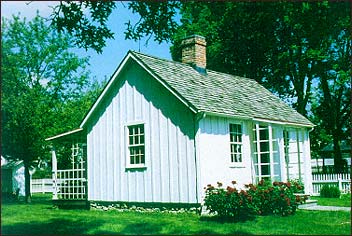Last updated: June 26, 2023
Lesson Plan
Herbert Hoover: Iowa Farm Boy and World Humanitarian

- Grade Level:
- Middle School: Sixth Grade through Eighth Grade
- Subject:
- Literacy and Language Arts,Social Studies
- Lesson Duration:
- 90 Minutes
- Common Core Standards:
- 6-8.RH.2, 6-8.RH.3, 6-8.RH.4, 6-8.RH.5, 6-8.RH.6, 6-8.RH.7, 6-8.RH.8, 6-8.RH.9, 6-8.RH.10, 9-10.RH.1, 9-10.RH.2, 9-10.RH.3, 9-10.RH.4, 9-10.RH.5, 9-10.RH.6, 9-10.RH.7, 9-10.RH.8, 9-10.RH.9, 9-10.RH.10
- Additional Standards:
- US History Era 7 Standard 2C: The student understands the impact at home and abroad of the United States involvement in World War I.
Curriculum Standards for Social Studies from the National Council for the Social Studies - Thinking Skills:
- Remembering: Recalling or recognizing information ideas, and principles. Understanding: Understand the main idea of material heard, viewed, or read. Interpret or summarize the ideas in own words. Applying: Apply an abstract idea in a concrete situation to solve a problem or relate it to a prior experience. Analyzing: Break down a concept or idea into parts and show the relationships among the parts. Creating: Bring together parts (elements, compounds) of knowledge to form a whole and build relationships for NEW situations. Evaluating: Make informed judgements about the value of ideas or materials. Use standards and criteria to support opinions and views.
Essential Question
How do childhood experiences shape someone's worldview?
Objective
1. To relate the events of Herbert Hoover's childhood in West Branch, Iowa, that may have motivated his concern for children around the world;
2. To understand the daily life of a rural community in the 1870s and 1880s;
3. To describe and evaluate the activities that led to Hoover's recognition as a good citizen of the world;
4. To discuss and give examples of ways they can act as good citizens in their own community.
Background
Time Period: 1870s-1930s
Topics: This lesson could be used in connection with studies of World War I, as an introduction to Hoover's presidency and the Great Depression, or in a unit devoted to citizenship.
Preparation
Although some people remember Herbert Hoover as the man who was President during the early years of the Great Depression, others may know him as a complex public servant, the "Great Humanitarian" whose career spanned a remarkable seven decades. A graduate of Stanford University, Hoover became a successful mining engineer before organizing relief programs for the starving victims of World War I.
As Secretary of Commerce under Presidents Harding and Coolidge, he helped to create safer highways and aircraft, better health care for children, and the standardization of commercial products. And, in 1927, he mustered a fleet of 600 boats and 60 airplanes to rescue 325,000 Americans who were left homeless during the catastrophic Mississippi River flood.
Following World War II, President Truman chose him to help the hungry people of Europe once again, and he spent his "retirement" years as an amazingly prolific author, speaker, and government adviser. Continuing his life-long desire to help needy children, he also served as chairman of the Boys' Clubs of America, helping to open 500 new chapters throughout the United States.
Lesson Hook/Preview
Shortly before Herbert Hoover (1874-1964) was inaugurated in 1929 as the 31st president of the United States, he made the following prophetic statement:
1 Richard Norton Smith, An Uncommon Man: The Triumph of Herbert Hoover, 103.
Procedure
Getting Started Prompt
Map: Orients the students and encourages them to think about how place affects culture and society
Readings: Primary and secondary source readings provide content and spark critical analysis.
Visual Evidence: Students critique and analyze visual evidence to tackle questions and support their own theories about the subject.
Optional post-lesson activities: If time allows, these will deepen your students' engagement with the topics and themes introduced in the lesson, and to help them develop essential skills.
Vocabulary
humanitarian
Great Depression
stock market
